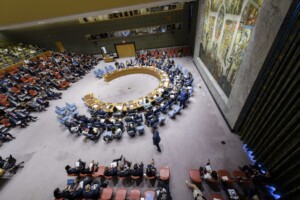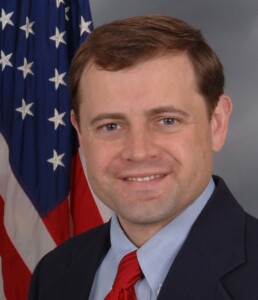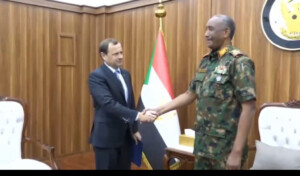Sudan’s UN ambassador seeks 2020 Unamid withdrawal
Sudan’s UN ambassador Omer Siddig has called upon the United Nations Security Council to pave the way for Unamid’s withdrawal by June 2020. He also seeks an end to restrictions imposed on the movement of arms and troops to and within Darfur.
 Unamid convoy in North Darfur (File photo: Mohamad Almahady/Unamid)
Unamid convoy in North Darfur (File photo: Mohamad Almahady/Unamid)
Sudan’s UN ambassador Omer Siddig has called upon the United Nations Security Council to pave the way for Unamid’s withdrawal by June 2020. He also seeks an end to restrictions imposed on the movement of arms and troops to and within Darfur.
Speaking at a meeting following a Security Council briefing on the situation on Sudan on Monday, Ambassador Siddig said: “Sudan is now a country that upholds democracy, justice, rule of law, transparency, and liberty… Given the political realities, peacekeeping is not the right option for Darfur.” He argued that “an end to the restrictions of movement of arms and troops is needed to maintain law and order and to prevent a relapse into violence.”

Omer Siddig (UN Photo)
Siddig went on to point out that Darfur is adjacent to volatile hotspots where terrorist organisations such as Daesh (Islamic State), Al Qaida and Boko Haram are active, and where illegal migration and human trafficking are rampant.
‘Sudan is now a country that upholds democracy, justice, rule of law, transparency, and liberty… Given the political realities, peacekeeping is not the right option for Darfur’ – Sudan’s UN ambassador Omer Siddig
Under-Secretary-General

Jean-Pierre Lacroix (UN Photo)
As previously reported by Radio Dabanga, during Monday’s briefing Under‑Secretary‑General for Peace Operations Jean-Pierre Lacroix told the Security Council that the security situation in Darfur is largely unchanged. Intermittent clashes between the Sudanese Armed Forces/Rapid Support Forces (RSF) paramilitaries and the Sudan Liberation Movement Abdelwahid faction (SLM/AW) still continue in Jebel Marra. The positive developments in Khartoum could mean ‘revisiting’ the timeline for resuming the drawdown of the African Union-United Nations Hybrid Operation in Darfur (Unamid), he added.
“This is an opportunity to put a definitive end to the conflict in Darfur,” Lacroix declared. “Such an effort will require an irreversible transition from peacekeeping to peacebuilding, as well as engagement in the peace process by groups that have not been part of the Doha Document for Peace in Darfur.”
‘Threats from military elements – particularly Hemeti and his RSF – will remain a dangerous constant for the foreseeable future’ – Prof Eric Reeves
Critique
Commenting on Under‑Secretary‑General Lacroix’s suggestion yesterday that the new government “could edge Sudan closer to stability,” prominent Sudan researcher and analyst Prof Eric Reeves said on social media: “The operative word here is ‘could’: the interim government could, with sufficient international assistance – particularly in the form of intense and unrelenting pressure on elements of the armed forces that are poised to snatch away the opportunity for truly civilian governance – create that which will bring Sudan peace, freedom, and justice. But that goal remains a long way from being achieved; and threats from military elements – particularly Hemeti and his RSF – will remain a dangerous constant for the foreseeable future.”

(sudanreeves.org)
Prof Reeves asserts: “The UN still can’t bring itself to speak honestly about Darfur: more than 2.5 million persons still displaced or refugees; relentless violence directed against non-Arab ethnic groups; obstacles to peace created by massive violent land seizures from same non-Arab ethnic groups.”
Unamid draw-down
In June, the Security Council unanimously decided to extend the mandate of the UN-AU Hybrid Operation in Darfur (Unamid) until 31 October, while also “temporarily and exceptionally” extending the period allocated for the mission’s drawdown.
According to a statement published on 26 June, the council has determined that the situation in Sudan “constitutes a threat to international peace and security”. Acting under Chapter VII of the Charter of the United Nations, it will extend its mandate as set out in resolution 2429 (2018), and further decides to extend, temporarily and exceptionally, the period of withdrawal of Unamid military personnel from Darfur.
Unamid
Unamid is scheduled to withdraw completely from Darfur by June 2020.
‘The failure of Unamid will be a defining moment in the history of UN peacekeeping in Africa’ – Prof Eric Reeves
After handing over team sites and headquarters to the Sudanese authorities in the past months, the mission’s new headquarters in Zalingei is now fully operational. The office of the Joint Special Representative Jeremiah Mamabolo has been relocated to Khartoum.
Denouncing the entire Unamid peacekeeping exercise as a ‘failure’, Prof Reeves comments: “What Unamid does not do, and has never dome effectively, is protect civilians and humanitarians – the core feature of its mandate. Indeed, the failure of Unamid will be a defining moment in the history of UN peacekeeping in Africa.”
Our editorial independence means that we can continue to provide factual updates about political developments to Sudanese and international actors, educate people about how to avoid outbreaks of infectious diseases, and provide a window to the world for those in all corners of Sudan. Support Radio Dabanga for as little as €2.50, the equivalent of a cup of coffee.










 and then
and then